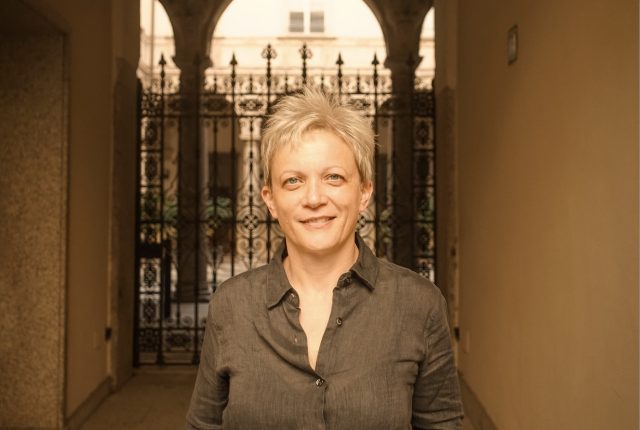
The work of generating alternative futures through the reinterrogation of the past, I believe, is the core mission of the CMRS Center for Early Global Studies and central to our public commitment to global and planetary equity. To make this mission and commitment clear, in September 2021, the Center underwent a transformation from the Center for Medieval and Renaissance Studies (CMRS), its name for fifty-eight years (1963–2021), to the Center for Early Global Studies (CEGS). These intentional and necessary changes to the Center’s core, driven by decades-long advancements within our fields and disciplines, have quickly borne extraordinary results. It is my honor to share some of them with you at the start of this AY 2023–2024.
On July 1, the Center was awarded a $1 million Mellon Foundation grant for a new initiative “Race in the Global Past through Native Lenses.” While I act as principal investigator of the grant, I have an invaluable partner in the project, Professor Shannon Speed, director of the UCLA American Indian Studies Center. The three-year award will support a substantive collaboration between UCLA and California Native and Indigenous communities. The goals of the initiative are to create disciplinary pathways and improve the institutional climate to counter the lack of Native epistemes in academic disciplines and buttress conditions for recruitment and retention of Indigenous faculty in the university. To do so, the grant will fund the research of scholars-in-residence, faculty, students, community advisors, postdoctoral fellows, and tribal managers of the UCLA Fowler Museum who will compare and co-learn the historical articulations of “race” in different parts of the globe in the period broadly defined as “premodern” or “pre-/early colonial.” The collaborative cohorts will gather in workshops focused on comparative processes of racialization in the global past and geared toward curricular design work and inflecting museum and institutional practices. This grant fulfills the promise of a research center dedicated to early global studies because it honors the Center’s existence on the shores of the Pacific and on Indigenous lands whose histories and cultures long preceded the arrival of European colonizers and settlers. To learn about the project, please see the UCLA Newsroom story.
The second major development is a gift of $552,000 from Arcadia, a charitable fund that works to protect nature, preserve cultural heritage, and promote open access to knowledge. This gift allows us to establish the John W. Baldwin Postdoctoral Fellowship at the UCLA CMRS Center for Early Global Studies. Over a period of five years, and starting in July 2024, the Center will welcome three (and up to five) new scholars completing fellowships in European and global comparative medieval studies. The ideal candidates will be recent doctoral graduates in European medieval studies whose work takes an inclusive approach to “Europe in the world” and who are conversant across academic disciplines. You can read more here.
Both these fundraising successes answer questions that many have asked: what does “early global” mean? What is “global” before globalization? I am proud to say that, as with any name, it is not so much what it says but what is done with it and how the research and scholarship subsequently inflect the resonance of the name. Before there was a European definition of “global” based on the historical fact of a completed European circumnavigation in 1522, many regions of the world were global and (inter)connected.
“Early global” encompasses all of the world’s regional diversities under the temporal purview of the Center from the third to the seventeenth century, which means multiple and comparative globalities rather than a vision of a uniform and single globe—that is, an early global world as a constellation of multiple forms of life whose premise is not a presumed planetary connectivity post-1522. The premise of CEGS is neither spatial nor temporal connectivity, but multiple globalities of early periods, as well as epistemological and methodological connectivities that contemporary scholarship allows. These are just some of the ways of understanding “early global,” which do not exclude Europe, but rather strengthen the state of its fields.
In line with these developments, I am very happy to welcome Professor Sixiang Wang (Asian Languages & Cultures) to the role of CEGS associate director for AY 2023–2024. I look forward to working with him in advancing our research mission as well as supporting UCLA’s faculty, students, postdoctoral fellows, and visiting scholars. You can learn about Sixiang here and read his Associate Director’s Letter in this edition.
I am also very pleased to introduce to you two new staff members to the Center, who joined us this summer: Sunterrah Palmer, our new communications specialist, and Alejandra Gonzalez Quiroz, humanities conference room and special projects coordinator. And in March, Thi Nguyen, our event manager, joined the team.
Our activities continue to be driven by our faculty’s and associate members’ innovative research and diverse methodologies, from conferences to research group meetings and workshops. They will be complemented for the next three to five years by the Mellon grant workshops and events proposed by our postdoctoral fellows. You can read about our planned activities in this newsletter; more information will be forthcoming in our monthly news blasts.
2023 is the year in which we are celebrating sixty years of the Center’s existence—and, as you can tell, we are working hard toward another sixty years! We hope that you will support us in this endeavor, intellectually, collegially, or financially.
Please consider supporting CEGS with a gift today.
As always, I welcome your comments, questions, and suggestions, and look forward to seeing you on campus.
Zrinka Stahuljak
Director, CMRS Center for Early Global Studies
Professor, Comparative Literature and ELTS

